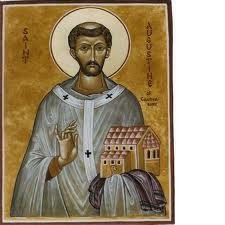
In the year 596, some forty monks set out from Rome to evangelise the Anglo-Saxons in England. Leading the group was Augustine, the prior of their monastery in Rome. Hardly had he and his men reached Gaul in France when they heard stories of the ferocity of the Anglo-Saxons and of the treacherous waters of the English Channel. Augustine returned to Rome and to the Pope who had sent them – St Gregory the Great – only to be assured by him that their fears were groundless.
Augustine again set out and this time the group crossed the English Channel and landed in the territory of Kent, ruled by King Ethelbert, a pagan married to a Christian. Ethelbert received them kindly, set up a residence for them in Canterbury and within the year, on Pentecost Sunday, 597, was himself baptized. After being consecrated a bishop in France, Augustine returned to Canterbury, where he founded his See. He constructed a church and monastery near where the present cathedral, begun in 1070, now stands. As the faith spread, additional Sees were established at London and Rochester.
Work was sometimes slow and Augustine did not always meet with success. Attempts to reconcile the Anglo-Saxon Christians with the original British Christians (who had been driven into western England by Anglo-Saxon invaders) ended in dismal failure. Augustine failed to convince the British to give up certain Celtic customs at variance with Rome and to forget their bitterness, helping him evangelise their Anglo-Saxon conquerors.
Labouring patiently, Augustine wisely heeded the missionary principles suggested by Pope Gregory the Great: purify rather than destroy pagan temples and customs; let pagan rites and festivals be transformed into Christian feasts; retain local customs as far as possible. The limited success Augustine achieved in England before his death in 605 – eight years after he arrived in England – would eventually bear fruit long after in the conversion of England.
Truly Augustine of Canterbury can be called the Apostle of England.